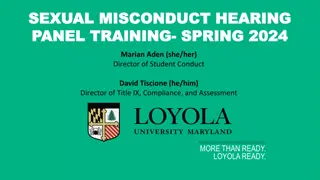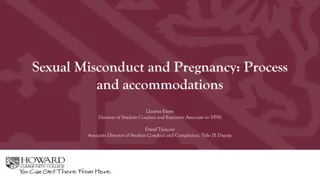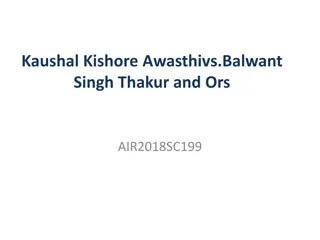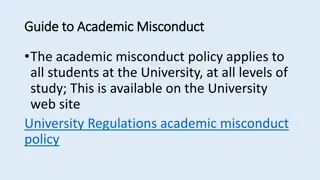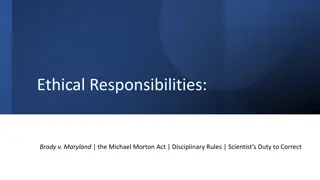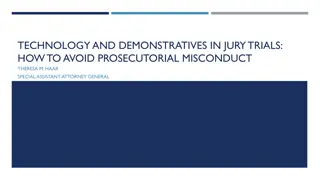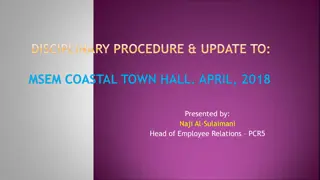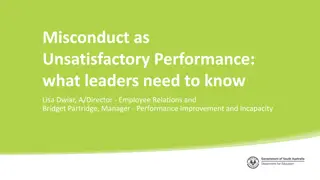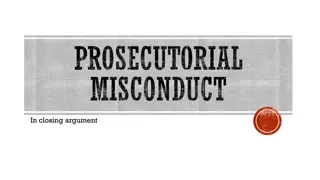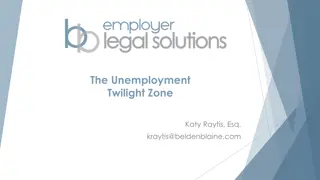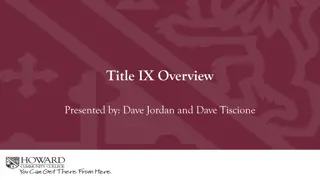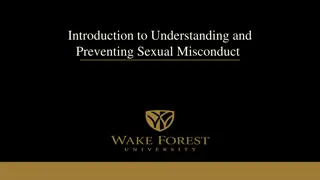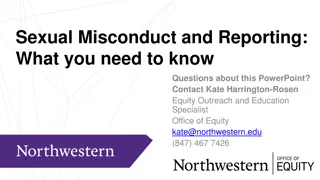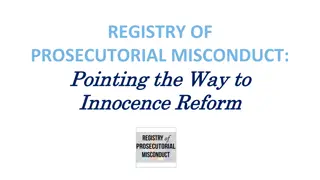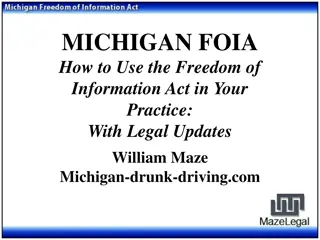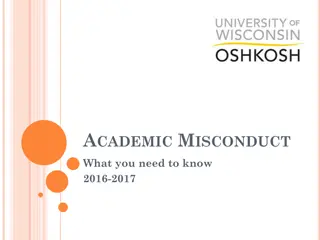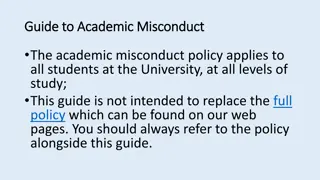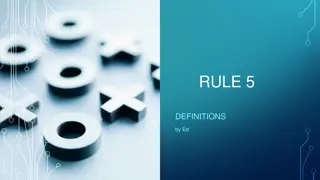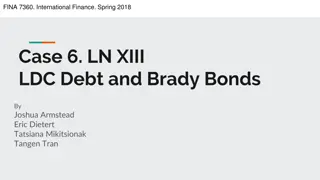Brady v. Maryland: The Case of Prosecutorial Misconduct
Brady v. Maryland was a landmark case where the defendant, Mr. Brady, was convicted of murder and sentenced to death. The case revolved around the prosecution's failure to disclose exculpatory evidence, violating Mr. Brady's due process rights. The Supreme Court held that prosecutors must share favorable evidence with the defense to ensure fairness in the justice system.
Download Presentation

Please find below an Image/Link to download the presentation.
The content on the website is provided AS IS for your information and personal use only. It may not be sold, licensed, or shared on other websites without obtaining consent from the author. Download presentation by click this link. If you encounter any issues during the download, it is possible that the publisher has removed the file from their server.
E N D
Presentation Transcript
In Brady v. Maryland, the defendant was convicted of: a) burglary b) robbery c) murder d) rape
At issue in Brady v. Maryland was whether: a) The introduction of false evidence against Mr. Brady at trial deprived Mr. Brady of Due process b) The prosecution s suppression of a co-defendant s confession denied Mr. Brady of due process c) The failure of the prosecution to turn over evidence supporting an alibi defense denied Mr. Brady of due process d) The failure of the prosecution to inform the defense that he was friends with the judge deprived Mr. Brady of due process
Mr. Brady confessed his involvement in the crime (murder in perpetration of robbery), but said he did not perform the actual killing Although he conceded guilt, his attorney argued that he should not receive the death penalty because he did not actually kill the decedent The government did not disclose that Mr. Brady s co- defendant admitted to actually performing the killing. Mr. Brady was convicted of first-degree murder and sentenced to death. After he was sentenced, Mr. Brady learned of his co- defendant s statement to the government. He moved for a new trial.
The basic rule: [T]he suppression by the prosecution of evidence favorable to an accused . . . violates due process where the evidence ismaterial either to guilt or to punishment, irrespective of the good faith or bad faith of the prosecution. 373 U.S. 83, 87 (1963).
NOT a technicality NOT a discovery rule . . . but a rule of fairness and minimum prosecutorial obligation . . . [that] is necessary to ensure the effective administration of the justice system. Curry v. U.S., 658 A.2d 193, 197 (D.C. 1995)
Prosecutors are required to disclose Brady information regardless of whether defense requests it However, always request Brady Focus prosecutors on the possible categories of Brady Assist in pretrial materiality determinations Assist in showing prejudice
[I]nformation of a kind that would suggest to any prosecutor that the defense would want to know about it because it helps the defense. Vaughn v. U.S., 93 A.3d 1237, 1254
The defense perspective controls. The critical task of evaluating the usefulness and exculpatory value of the information is a matter primarily for defense counsel, who has a different perspective and interest from that of the police or prosecutor. Miller v. U.S., 12 A.3d 1094, 1110 (D.C. 2011)
Includes both exculpatory and impeaching information. In fact, [i]mpeaching evidence is exculpatory, and thus can be material to guilt or punishment within the meaning of Brady. Lewis v. U.S., 408 A.2d 303, 307
Information tending to cast doubt on defendants guilt on any element Physical evidence, testing, or reports making guilt less likely Failure of witness to make a positive identification* Difference in description and defendant s physical appearance Information linking someone else to crime Information supporting an affirmative defense Information casting doubt on admissibility of government s evidence Information supporting pretrial constitutional motions Information diminishing culpability or supporting lesser punishment Inconsistent statements regarding crime Potential physical or mental impairment of witness Witness bias Information relating to witness s dishonesty or criminality
FACTS Client is charged with carjacking. CW testifies in the grand jury that he was sitting at a stop light when Client ordered him out of his car. Client tells you that he had a conversation with CW, exchanged numbers, and CW got upset when Client refused his sexual advances. He claims that there is proof: CW s number is in his call log around the time of the incident. The gov t has his cell phone. What would you argue under Brady?
The government has an independent obligation to disclose favorable information in its possession. See U.S. v. Agurs, 427 U.S. 97, 107 (1976) Need not be admissible as evidence at trial Need not have been memorialized
On appeal: To assess materiality, [the Court] consider[s] whether there is a reasonable probability that, had the evidence been disclosed to the defense, the result of the proceeding would have been different. Vaughn, 93 A.3d at 1262. The standard is different pre-trial.
Duty to disclose is more inclusive, requiring disclosure of all arguably favorable material. See Boyd v. U.S., 908 A.2d 39, 61 (D.C. 2006) Materiality determination must be made with a view to the need of defense counsel to explore a range of alternatives in developing and shaping a defense. Id. At a minimum, questionable material should be provided to the court for in camera inspection. Id.
In general, make specific Bradyrequests in writing and follow up diligently on those requests. File Brady letters with the court. Move to compel Brady, if necessary, or request anin camerareview of favorable information.
Materiality of favorable information should be considered collectively (see Kyles) Information is material because it undermines the quality of the investigation in the case (even if it does not go directly to the government s theory) The government s representation that there was no Brady harmed the defense The government s failure to produce information is indicative of its materiality (hiding the ball)
D. C. Rule of Professional Conduct 3.8 as an ethical matter, prosecutors must disclose all exculpatory material, regardless of materiality. BUT, because it is an ethical obligation, it does not create rights enforceable by our clients.
[T]he individual prosecutor has a duty to learn of any favorable evidence known to others acting on the government s behalf in the case, including the police. Kyles v. Whitley, 514 U.S. 419, 437 (1955) Brady does not tolerate the governments failure to turn over an easily turned rock. Vaughn, 93 A.3d at 1258.
A prosecutor need not have actual knowledge. Knowledge of the entire prosecution team is imputed to the prosecutor. Kyles, 514 U.S. at 437; Powell v. U.S., 880 A2d 248, 254 n.14 (D.C. 2005)
Disclosures must be: Timely Accurate Complete Usable See Vaughn, 93 A.3d at 1262.
The governments obligation to make timely disclosures is grounded in the very reason Brady disclosures are required: to provide protection against miscarriages of justice. Vaughn, 93 A.3d at 1257 As soon as practicable Well before scheduled trial date No last-minute information dumps No strategic delay Earliest feasible opportunity Early enough for meaningful use
Client is accused of stealing a phone at a school. The day before trial, the government discloses that the lead investigative officer saw multiple suspects fleeing from the scene. This was caught on video, but not preserved. The same day, the government disclosed a written confession on a phone from another suspect. The government had this phone in its possession for two months before making the disclosure. The government argues that this was not exculpatory because it had an eyewitness who claimed that Client stole the phone. What is your response?
Key is ability for meaningful use by defense. Summaries are allowed, but . . . Even if it is theoretically possible for the government to fulfill its disclosure obligations under Brady by means of summaries of preexisting documents, such summaries must be sufficiently specific and complete. Vaughn, 93 A.3d at 1259. Required level of detail is from the defense s perspective: every detail that might have been relevant to defense counsel s preparation as counsel viewed the case. Id. Defense must be on notice that a Brady disclosure is being made.
The trial judge enjoys a broad range of possible sanctions, with the sole limitation being that the sanction be just under the circumstances. Odom v. United States, 930 A.2d 157, 158-9 (D.C. 2007)
You must show harm/prejudice! What might you have done differently in investigation, in preparation, in presentation? Have witnesses died or gone missing? Has evidence been destroyed? Are there memories that have since faded? Has the prosecution gained an unfair advantage? This is extremely case-specific.
Creative Sanctions Be creative and bold, request your ideal sanction There are more sanctions than dismissal and standard Redbook instruction When someone is dead, shot, or sexually abused, juries want to hold someone accountable need sanction that weakens government s evidence and/or strengthens defense s theory Try to tie Brady to the evidence that hurts you the most in the government case, so that you can request a sanction/remedy that undercuts government s strongest evidence Try to tie Brady to your defense theory, so that you can request a sanction/remedy that offers affirmative evidence of your defense
Dismissal Excluding witness testimony Precluding redirect or government argument Entering hearsay, documents, or representations through stipulation Stipulation Dismissing counts of indictment Continuance with client s release
GOAL: MAKE SURE GOVERNMENT IS MAKING REPRESENTATIONS IN WRITING OR ON RECORD AT EVERY POSSIBLE JUNCTURE Presentment Hand one-page Brady request Make oral request Preliminary Hearing File stock Rosser letter, include broad scope of Brady information Craft questions aimed at uncovering Brady Make oral request and inquire through court whether government has Brady information that have not disclosed Status Hearing and Trial Readiness Hearing File more specific Brady letters for common types of Brady or requests for additional discovery based on prior disclosures Make oral request and inquire through court whether government has Brady information that have not disclosed
Dont let the government collapse the litigation to address only prejudice and sanction/remedy The government has an incentive for the court not to make findings and not to address certain elements of the analysis
ASK FOR AN EVIDENTIARY HEARING Always request an evidentiary hearing with testimony. If evidentiary hearing with testimony denied, always request written responses and/or oral proffer Whether the information is favorable to the defense Whether the information is material to the defense Whether the government possessed the information Whether the government suppressed the information
To determine on appeal whether the government, through its representatives in the trial court, has violated its obligations under Brady, we consider: (1) whether the information in question is favorable to the accused ; (2) whether this information was possessed and suppressed by the government, either willfully or inadvertently ; and (3) whether that information was material, i.e., whether there is a reasonable probability that, had the evidence been disclosed, the result of the proceeding would have been different. Miller, 14 A.3d at 1109. If the information was favorable, suppressed, and material, then reversal is required, irrespective of the good faith or bad faith of the prosecution.


